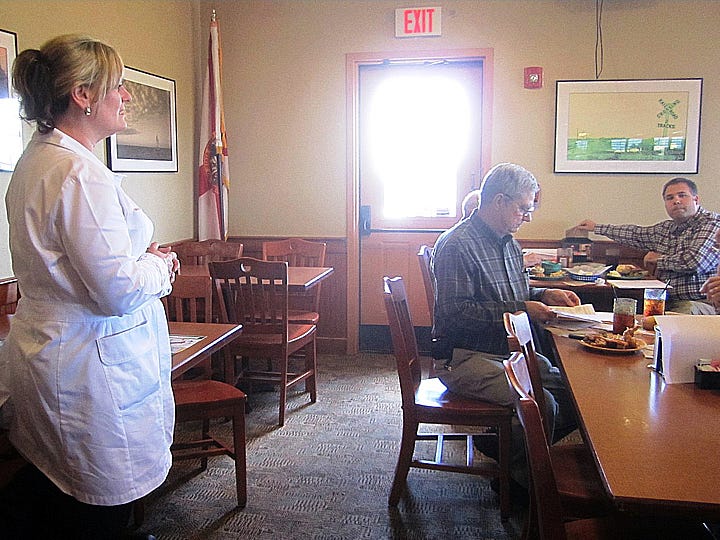
CRESTVIEW — An estimated 40 percent of North Okaloosa residents carry an infectious bug on their skin, but taking preventive actions can curb its effects, according to local health care professionals.
MRSA, the common name for Methicillin-resistant Staphylococcus aureus, is among infectious diseases spreading in the area, North Okaloosa Medical Center infection control nurse Lida Deonarine said.
Symptoms can include red bumps, which initially resemble acne and eventually can become painful, potentially life-threatening abscesses that require draining, according to the Mayo Clinic.
"MRSA is very easy to kill until it gets inside (the body) — then it gets very hard to kill because it is resistant to antibiotics," Deonarine said.
However, "it is not as scary as it might sound," she said. "Most of the time, if we (practice) good hand hygiene, we're not going to spread it. It's not airborne. It's just spread by contact."
Deonarine, speaking last week to the Crestview Area Ministerial Association, said applying alcohol-based hand sanitizer helps prevent infection.
Flu admissions increase
NOMC is admitting more flu patients this year than in previous years, including 2009 when the H1N1 strain was first identified, Deonarine said.
Influenza, like MRSA, is an infection that can be spread by contact.
"It's not floating in the air. It's spread by secretions," Deonarine said, adding that people should cough in their elbow, rather than their hands, to prevent touching something and spreading the disease.
Everyone should keep a bottle of hand sanitizer in their car or purse for when they come in contact with commonly touched surfaces such as gas pump handles and door knobs, Deonarine said.
Take precautions — don't panic
The Rev. Joe Butryn, youth minister at Joy Fellowship, took the message in stride, acknowledging the importance of taking preventive measures while cautioning his colleagues about over-reacting to infectious bacteria's presence.
The Rev. Jim Vail of First Baptist Church of Baker agreed. For him, he said, the simple hand-sanitizing precaution Deonarine advised has been effective.
"After shaking hands after church, I always wash the fellowship off my hands," Vail joked.
About MRSA
Methicillin-resistant Staphylococcus aureus infection is caused by a staph bacteria strain that's become resistant to antibiotics that treat most staph infections. Applying alcohol-based hand sanitizer can help prevent spread of the disease.
Health care-associated MRSA infections typically are associated with invasive procedures, such as surgeries, intravenous tubing or artificial joints.
Community-associated MRSA is spread by skin-to-skin contact. At-risk populations include high school wrestlers, child care workers and people who live in crowded areas.
Source: The Mayo Clinic
How to be a good visitor
Here's how to prevent spreading infections when visiting someone in the hospital:
• Wash your hands before and after visiting the patient. Soap and hand sanitizer are in each NOMC room and in the hallways.
• Stay home if you are sick or have been sick in the past three days.
• Ask hospital staffers if it's safe to take children, food or flowers into the room
• Follow special precautions, if necessary, if the patient is on "isolation precautions"
• Don't contribute to the clutter by bringing too many patient belongings.
Source: North Okaloosa Medical Center
Email News Bulletin Staff Writer Brian Hughes, follow him on Twitter or call 850-682-6524.
This article originally appeared on Crestview News Bulletin: 40 percent of area population could be carrying MRSA bacteria
